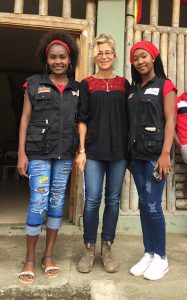
Viviane Weitzner has been working on issues at the crossroads of Indigenous and Afro-Descendant rights and extractives in the Americas for over 15 years, supporting engaged collaborative research with peoples’ organizations both with the not-for-profit world, as well as with academia. She was a SSHRC-funded Postdoctoral Researcher with CICADA from 2018 to 2020.
As former senior researcher, governance and natural resources, with The North-South Institute based in Ottawa, she led a decade-long research programme examining Indigenous perspectives to free, prior and informed consent and decision-making in the face of extractives in the Americas, with components in Guyana, Suriname, Peru, Colombia and Canada (see final policy brief or full final report). Since 2013, she has worked as a policy advisor (consultant) on business and human rights with the UK-based Forest Peoples Programme.
Viviane’s academic research is rooted in the anthropology of legal pluralities, and is grounded in ethnography of an innovative and unlikely alliance between Indigenous and Afro-Descendant Peoples in Colombia and their struggle to defend their gold-rich ancestral territories, self-regulate mining activities, and uphold their rights and way of life in the lethal context of armed conflict. Her PhD thesis, entitled “Raw Law/Raw Economy: Ancestral Peoples, Mining, Law and Violence in Colombia” (February 2018), draws on over eight years of collaborative research with the Embera Chamí Indigenous People of the Resguardo Indígena Cañamomo Lomaprieta (Riosucio and Supía, Caldas) and with Black Communities represented by the Palenke Alto Cauca in the years just prior to and during the negotiation of the peace accords between the Santos government and the Revolutionary Armed Forces of Colombia.
Her PhD work was undertaken at the Centro de Investigaciones y Estudios Superiores en Antropología Social (CIESAS) in Mexico City, with funding by Mexico’s Conacyt, Canada’s SSHRC and Norway’s University of Life Sciences. Her doctoral research was highlighted in the “Extracting Justice?” Project led by the University of Life Sciences in Norway, which led to the publication of one single-authored and one co-authored article in a 2017 special edition of Third World Quarterly. Viviane also received the Law and Society Association’s 2019 Dissertation Prize Honorable Mention for her PhD thesis.
At McGill, Viviane is co-leading the development of the “Indigenous Rights, Indigenous Law and Interlegality” research axis of CICADA. She continues to undertake collaborative research with the Palenke and the Resguardo, and is documenting how they are strengthening their autonomous land stewards known as the Guardia Indígena and the Guardia Cimarrona, and the encounters and “coordination” of this process with state agencies. In addition, Viviane is a member of the Steering Committee for the University of London-led project “The Juridification of Resource Conflicts: Legal Cultures, Moralities and Environmental Politics in Central America and Mexico.” In 2018 she received a Young Scholar Award from the International Commission on Legal Pluralism for best article, forthcoming in the Journal of Legal Pluralism and Unofficial Law. Viviane has a Master’s in Natural Resources Management from the Natural Resources Institute at the University of Manitoba, and a BA from McGill University (English literature).
Contact: viviane(dot)weitzner(at)mcgill(dot)ca
